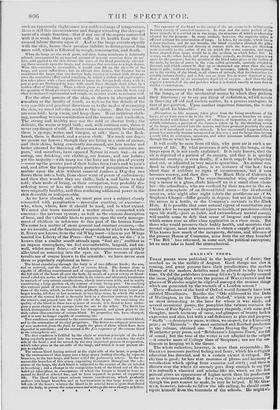GRAHAM ' S POEMS.
THESE poems were published in the beginning of June; they reached us in the middle of August. Good things are slow in coming, and great persons have their peculiarities; the modem Homer of the modern Achilles must be allowed to take his own time. Or did the publishers (cunning fellows!) designedly suspend the issue, judging that even the praises of WELLINGTON and the glories of Waterloo might be slighted amongst the meaner things which are generated by the warmth of a London season ?
These effusions of the bard of Oxford would formerly have been entitled Miscellanies. Besides the "Ode addressed to the Duke of Wellington, in the Theatre at Oxford," which we pass over as most interesting to the hero for whom it was made, and several occasional pieces, the pamphlet-like volume contains the "Vision of Fair Spirits"—a fragmentary rhapsody, with some goal thoughts, much harmony of verse, and glimpses of beauty both in expression and idea, but with a sad deficiency in plan and purpose; " Staffa "—a descriptive poem, written, we suspect, for a University prize; as "Grenada"—the most sustained and finished production in the volume, obtained one. "Aaron Staying the Plague"—a Winchester prize poem, and "Belshazzar's Impious Feast," are full of sound; but the tone of the writer is not adapted to the subject —it smacks more of College than of Scripture; or are the sen- timents in keeping wilh the theme.
The whole collection, however, is more than respectable ; Mr. GRAHAM possesses poetical feeling and fancy,, which his collegiate education has directed, and to a certain extent developed. Ills rhythm is good; he has that neatness of phrase and harmony of versification which spring from exercise and study ; and film is thrown over the whole (it scarcely goes deep enough to say that it is imbued) a classical and scholar-like air, which on the first perusal gives an appearance of higher merit than his productions are in strictness entitled to. In a tyro, this is advantageous; for though the poet cannot be made, he may be helped. If Mr, WA"' HAM, however, intends to follow the idle calling, he should eman:• °irate himself from the trammels of the schools, lie might wk




















 Previous page
Previous page